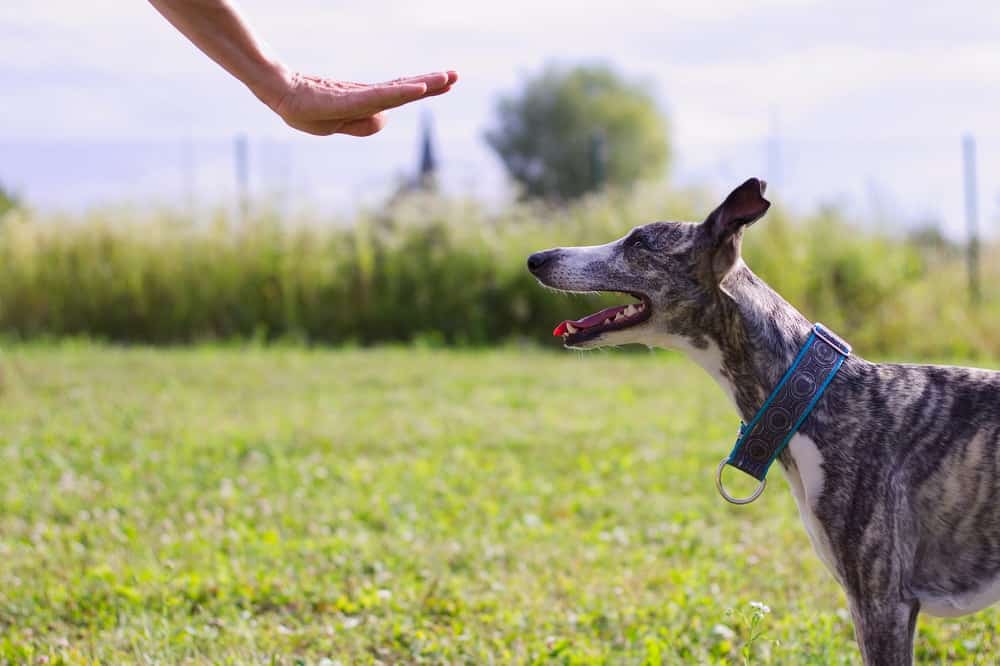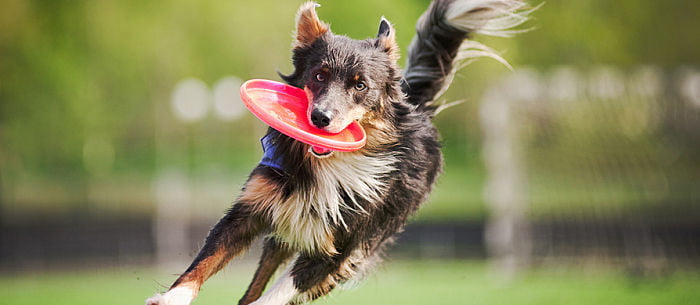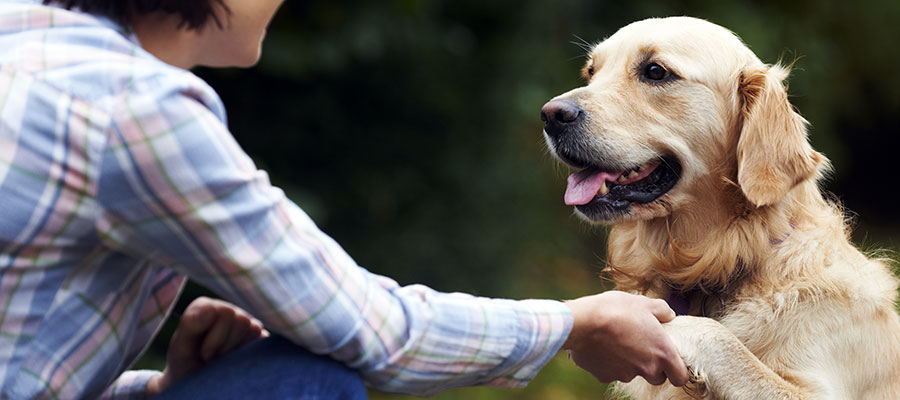The question of how to Train A Lab Puppies Not To Bark is perhaps one of the more common ones that dog owners have.
There is no doubt that no matter whether you are bringing a Labrador Retriever puppy home for the first time or not, it will take some time for your Labrador puppy to adjust to living with you.
Because of this, you may notice that your Labrador Retriever pup is constantly barking at absolutely everything he sees.
In addition to this being a normal occurrence, you may want to minimize this to the extent that you are searching for answers on how to train a Lab puppy not to bark. Here are some quick tips on what you need to learn about.
Find out why your Labrador is barking
It is normal for your Lab pup to bark from time to time. It is part of their natural behavior. You may find that they bark as a means of communication.
There may be instances in which a dog barks only out of excitement or because it needs to go outdoors to the bathroom.
However, other factors can cause your Labrador Retriever puppy to bark, and therefore you will need to take a different approach to the problem.
Lab puppies bark for a variety of reasons:
- Trauma
- Fear and uncertainty
- Loneliness or boredom
- Anxiety
- Wanting attention
Train A Lab Puppies Not To Bark
If you want to learn how to stop a Lab puppy from barking, here are some ways you could use:
1) Ignore them and do not respond to them.
There is a high probability that most Lab puppies will start barking the moment they get into their crates. If you wish to train a Lab puppy not to bark, you need to know how to discipline them properly so that they feel that you have their best interest at heart.
Thus, the best thing to do is not to coddle them when it is time to go to bed, since that is when they should go into the crate. You should instead ignore your puppy when the time comes.
In addition to that, you can also ignore them if they are barking for something that they want, but they do not need it right away.
It would be ideal for you not to leave the room as soon as you enter as they may develop separation anxiety. Despite this, you cannot give in to what they want.
Ignoring them for a long period will depend on how long you are willing to wait. It has been observed that some people wait between 5 and 20 seconds before paying attention to their dogs again.
There is usually nothing you can do except wait until they stop barking, and then you can pay attention to your Lab.
When your puppy is in its crate, this is like a child learning that it is time to go to sleep when they are in their crate.
Eventually, your puppy will learn to stop barking when the crate door is closed. It may take some time, but in time, your puppy will be able to close the crate door by himself.
2) Reward appropriate behavior.
If you reward your dog for barking right away, and you immediately give them what they want, they will start to believe that barking is a good thing.
You will hear them barking whenever they want something because they think that if they bark you will give in to them.
However, you must take note that you will need to learn how to reward your dog appropriately if you want him to behave well.
If, for instance, they want more food but have already finished their meal, they may start barking. If you don’t want to fill their bowl again, you can follow our first tip of ignoring them instead.
Upon seeing your dog stopping barking and behaving properly, you can now begin paying attention to them again. Tell them to thank you for not barking and give them a tasty treat for their good behavior.
This is the period when you can give them treats when you are training them on how to bark and stop on command.
It is possible to reward your dogs with a treat every time they listen to your command.
3) Never yell.
It is not uncommon for dog owners to become frustrated and yell at their dogs for them to be quiet. However, that is not good for their mental health as it can cause them to feel sad and uneasy.
There is a possibility that they may not understand why it is bad for them to bark without any reason.
Furthermore, yelling rarely works as a way to get someone’s attention. Dogs may assume that you are barking with them, so they will continue barking all the time.
You would be better off ignoring your dog or telling them to keep quiet rather than yelling at them.
4) Tell your family about it.
When you tell your dog that it is not okay for him to bark all the time, but other family members encourage him to bark, he will be extremely confused.
Even though Labradors are intelligent dogs, they will not know what to do if several people tell them to do things that are different from each other.
You should let other members of your household know that you are trying to get your Lab puppy to stop barking excessively.
Please let them know about the techniques that you are doing so that they don’t get in the way of your dog’s progress.
You need to be consistent when it comes to teaching your Labrador, so everyone should be aware of what you are teaching him.
5) Get rid of triggers.
Some things trigger your dog to bark. Some dogs are extremely fond of looking out the window and barking at anyone passing by, for example.
You can close the curtains so that they will not be able to see that. By doing so, their motivation to bark at random people will be significantly reduced.
If you can keep your dog inside, this may also be helpful. If your dog is still a puppy, you should not leave him unattended for a long period, especially if he is still young.
6) Get them used to new things.
It is not uncommon for some dogs to bark out of excitement or simply because they do not know what is going on.
The first thing that you need to do is to teach your dog to become accustomed to certain things so that they will be less likely to bark at certain things.
They will likely bark whenever they see a dog in the park, for instance. As your Lab puppy grows, you can gradually introduce them to new dogs-which is a great way to teach him social skills-so he will eventually get used to being around other dogs.
As well as rewarding them when they are quiet, you can also tell them that they are doing a very good job.
7) Lots and lots of exercises
Many puppies bark as a sign of boredom and hyperactivity. Labradors are high-energy dogs, which means that they should do a lot of exercises to burn off all their energy.
You should make sure that your puppy gets enough time to play and walk each day. If they have enough time to play and walk, they will feel less inclined to bark.
In our previous post, we had mentioned that a Lab puppy will require about five minutes of exercise every month of his or her life if he or she is to be healthy.
They can then play up to twice that amount a day (if they choose to do so).
During the first five months of a puppy’s life, he or she can play for as long as 25 minutes at a time. That is up to twice a day.
Because of this, they can play for a short period each day. Depending on the reaction of your Lab puppy, you may want to increase or decrease that amount.
If you want to keep your dog busy, you can also leave a variety of fun, interactive toys around for him to play with.
If you cannot play with them, there is a wide variety of puzzle toys, like KONG toys, that can keep them occupied for an hour or two if you cannot.
In conclusion
If you are looking for an effective way to train your Labrador Retriever puppy not to bark, you have to use positive reinforcement.
The following are several tips that we have enumerated above for your guidance and reference to carry out this task.
It is important to keep in mind, however, that it may take some trial and error before you come up with the best method of training a Lab puppy not to bark.
It’s just a matter of being patient. If you need assistance, be sure to seek professional assistance.
Why does my lab puppy keeps barking?
Labradors especially are a very intelligent and social breed. If they aren’t mentally stimulated and enjoy lots of social interaction, they quite quickly become bored. And when bored they will often try desperately hard to get some social interaction and they do this by barking for attention.
How do I get my lab to be quiet?
To stop your Labrador barking you will need a clicker, and some nice juicy little chunks of roast chicken, sausage or beef. Cut the chunks very small so that they are not much bigger than a pea. The reason for using a clicker is that initially, the gaps in your puppy’s crying may be very brief.
How do I stop my Labrador from barking at strangers?
Remember, build good habits and quiet behavior right from the start. Reward your puppy often when he is quiet and relaxed. Ignore any noise, don’t be tempted to start a ‘conversation’ with your barking dog.
What age do Labradors calm down?
With the right handling techniques, most young Labradors begin to calm down around their first birthday. And are fairly ‘settled’ in temperament by the time they are eighteen months old. In a moment we’ll look at ways to avoid some of the excitable puppy behavior that causes problems.
At what age do Labradors start barking?
Canine vocalizations usually begin around 2 to 3 weeks of age, following the period where a puppy’s eyes and ears are opened. Your puppy’s first vocalizations may be grunts and whines; around seven or eight weeks, these will develop into yips and barks, although some dogs wait until closer to 16 weeks to start barking.



